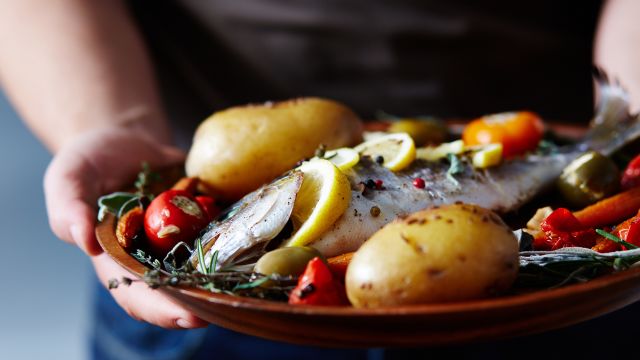Updated on February 28, 2024
Remember when any fat was considered "bad" fat? When the only difference between a croissant and a Krispy Kreme was snob appeal? Now that (happily) science has found that some fats are healthy, it's all about avoiding the unhealthy ones. But if sorting out omega-3s from saturated fats makes you want to drown your frustration in a quarter-pounder and fries (a whopping 56 grams of the least-healthy stuff), here's a simple list that rates fats, from the top to the bottom.
Top fats: Omega-3s
Among the best fats on the planet, omega-3 fatty acids can help add years to your life by dramatically reducing the risk of heart attack and stroke. They may also stave off arthritis, depression, and some cancers, and might even tame menstrual cramps and postworkout soreness. Looking for clear, soft skin and great hair? Omega-3s can help with that, too.
Eat these frequently:
- Fatty fish, such as wild salmon, sardines, herring, and tuna
- Flaxseeds and flaxseed oil
- Walnuts
Healthy fats: Monounsaturated fats
All monounsaturated fats are kind to your heart because they raise levels of HDL (aka "good" cholesterol) and lower levels of LDL (aka "bad" cholesterol, the kind that clogs arteries). But virgin olive oil, the leader of monounsaturated fats, does more. For starters, it contains micronutrients that are needed for hormone and enzyme production. Olive oil also boasts compounds that may reduce the risk of breast and colon cancer as well as boost the cancer-fighting power of other foods.
Delicious sources are:
- Olives
- Virgin olive oil (be sure it's virgin, which means its the least processed; processing destroys nutrients)
- Canola oil
- Peanut and other nut oils
- Nuts
- Avocados
Mostly healthy fats: Polyunsaturated fats
Most polyunsaturated fats are heart-friendly, but, with the exception of omega-3s, they don't have the star power of other healthy fats. Also, polyunsaturated fats include omega-6 fatty acids, which are healthy unless you get too many of them. Most Americans get up to 25 times more omega-6s than they need.
Omega-6s should be eaten more sparingly because they can overwhelm the benefits of omega-3s. Overall, try to get most of your polyunsaturated fats from omega-3 sources.
Find them in:
- Corn, soybean, safflower, canola, sunflower, and cottonseed oils
- Fatty fish (canned light tuna counts)
Unhealthy fats: Saturated fats
Saturated fats are mainly trouble because they can raise blood cholesterol to artery-clogging levels. Loading up on saturated fats may also harm brain molecules that help form memories, raising the risk of dementia.
Skimp or skip:
- Meats, particularly with visible fat
- Poultry skin, fat, and dark meat
- Whole-milk dairy foods, including butter, full-fat cheeses, ice cream, sour cream
- Most hard margarines (those in stick form)
- Coconut and palm oils
- Lard and shortening
Very unhealthy fats: Trans fats
These fats are so unhealthy—even dangerous—that as of 2023 the U.S Food and Drug Administration (FDA) banned manufacturers from using them in food (though they still appear in small quantities in some packaged and restaurant foods).
Trans fats are formed when liquid oils are infused with hydrogen, turning them solid (like stick margarine). Processed foods that contain trans fats have a lengthy shelf life. That's in fact why trans fats were invented: to keep food from going bad. But trans fats turned out to boost LDL, decrease HDL, clog arteries, and set off inflammation throughout the body, which can trigger a host of problems, from stroke to diabetes.
Avoid completely:
Though things are changing quickly, be suspicious of any fast or processed food that's not labeled trans-fat-free (packaged-food labels must now list trans fats), including:
- All deep-fried foods, including chips, French fries, onion rings, and donuts
- Many fast foods
- Candy
- Commercial baked goods, such as cookies, pies, cakes, rolls, and muffins






